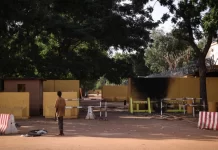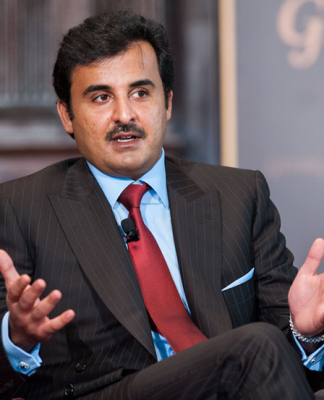Once the two parties to the conflict in Libya, the Al-Wefaq government forces in Tripoli and Haftar’s militias in the east, announced a halt to the fighting, until the media outfits supporting Haftar in Egypt and the UAE announced that their countries had forced Al-Wefaq and Turkey to stop the war.
The recent facts on the ground belie the “Abu Dhabi Cairo” axis supporting Haftar, because the defeated is the one who lost the land and was forced to withdraw from it. The talk here is about Haftar and his supporters, not reconciliation, and without the equation in the conflict is Turkey entering the battlefield.
While the media of the pro-Haftar axis in Cairo and Abu Dhabi tries to portray the ceasefire as an achievement for them, and inspired by their will, the transformations that have taken place and the reality of the defeats belie these allegations.
An empty analysis and a clear lie ..
The agreement between the parties to the Libyan conflict came after a brutal war for more than a year, and absolute support from Cairo and Abu Dhabi for Haftar, whose successive failure and defeats were confirmed, but the media arms of Haftar’s supporters reversed the facts, portraying the developments of events and declaring the cease-fire a victory for the will of Sisi and Mohamed bin Zayed.
The Egyptian and Emirati media now see that the Cairo declaration and Egypt’s position in support of Haftar in Libya and President Sisi’s warning against crossing the Sirte-Jufrah line and the steadfastness of the Libyan army are all factors that forced the Erdogan and Sarraj government to announce its readiness for a ceasefire in Libya.
These analyzes contradict the reality of the situation and the nature of the battle that was taking place, and by going back to recent history, we will find the size of Haftar’s transformations and failures, evidence that nothing remains before his allies but negotiations and recognition of the fait accompli.
More than a year ago, Haftar achieved overwhelming victories, until he reached the outskirts of the Libyan capital, Tripoli, and was on the verge of its fall, and the Egyptian-Emirati project to establish a military regime in Libya was about to be announced.
But the winds came with something that the ships did not desire, when Haftar suffered terrible defeats by the Turkish-backed Al-Wefaq forces, losing vast areas of land, in addition to huge material and moral losses, to dissipate the dream of control and rule, and impose on him the reality of negotiations that his allies Egypt and the UAE are reluctantly swallowing. .
On August 21, the two parties to the conflict in Libya issued orders to cease all hostilities, as the United Nations, the United States, Turkey, Germany, Russia, Italy, Canada, Qatar and Egypt welcomed the ceasefire agreement as a prelude to a political settlement.
Fayez Al-Sarraj, head of the Presidency Council of the Government of National Accord, issued instructions to stop all combat operations in all Libyan territories in an effort to regain sovereignty over the entire country and the exit of foreign forces and mercenaries, according to Al-Sarraj’s instructions.
One of the most prominent terms of the agreement between the two conflicting parties was the start of exporting oil and placing the oil fields under the National Oil Company’s insurance only, which means a severe loss of Haftar’s strategic and financial influence, who alone controlled that process.
It was also agreed that the demilitarized cities of Sirte and Al-Jufrah would be with a joint police force to maintain security. These strategic areas were totally subject to Haftar’s influence, and their fall into the hands of Al-Wefaq was worried by the head of the Egyptian regime, Abdel Fattah Al-Sisi, and considered them a “red line.”
Haftar rebelled against everyone and rejected the agreement
In light of these developments and a rebellion against the Emirati and Egyptian blessing of the ceasefire, the retired Libyan Major General Khalifa Haftar announced the rejection of the ceasefire agreement announced by the Presidential Council of the internationally recognized Libyan government and the Tobruk Parliament on Friday, describing it as an attempt at media marketing, while the Government of National Accord considered that Haftar wants to return to the square of war.
On Sunday, Ahmed Al-Mesmari, a spokesman for Haftar’s forces, said that his forces are ready to respond to any attempt to attack his positions around the coastal city of Sirte and Jufrah in the south.
Al-Mismari added – in a press conference – that there are meetings held by the Libyan government forces, and they decided to attack the strategic city of Sirte.
In his statements, the spokesman for Haftar’s forces avoided commenting on the demand of Tobruk Parliament Speaker Aqila Saleh on all sides for a ceasefire.
Al-Mesmari’s statements are the first official response from Haftar’s forces, after announcing a ceasefire on Friday and calling for the resumption of oil production.
On the other hand, a spokesman for the Libyan Foreign Ministry, Muhammad al-Qiblawi, said that Haftar wants to return to the square of war, and demanded – in a meeting with Al-Jazeera – that Aqila Saleh assume his responsibilities according to the statement he announced and as a party to the Skhirat Agreement.






























